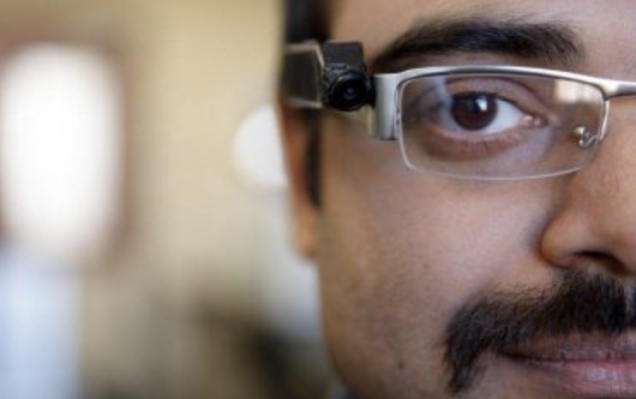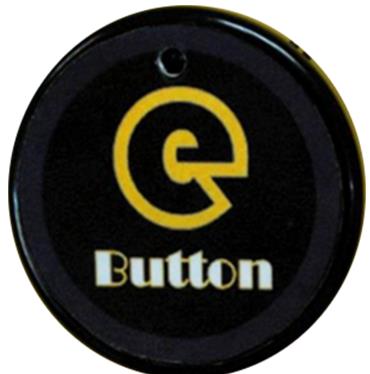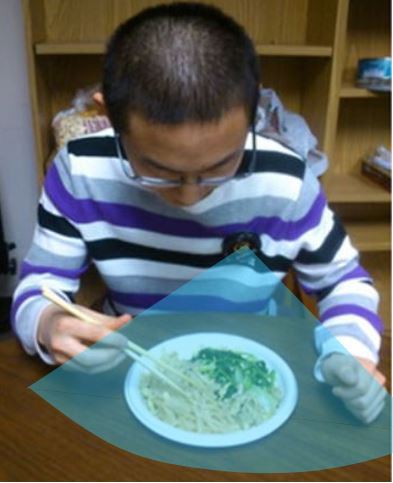Research
Dietary Assessment with Wearables
Dr McCrory and her collaborators are researching new and improved ways to measure diet objectively, with more accuracy and less burden on research participants than previously possible using state-of-the-art technology. The main focus of these studies is on wearable devices. Dr McCrory currently has 4 funded research projects in this area. Read more about the projects below.
Automatic Ingestion Monitor (AIM)
 The AIM was developed by Dr Edward Sazonov, Professor of Electrical and Computer Engineering at the University of Alabama, Tuscaloosa Dr. Edward Sazonov – College of Engineering | The University of Alabama (ua.edu). The AIM combines an optical sensor to detect chewing with a micro-camera to take pictures of foods and beverages as they are being eaten. The device can be worn on a user’s own eyeglasses or researcher-supplied eyeglasses without corrective lenses. Read more about Dr Sazonov’s lab here (Edward Sazonov, Ph.D. (ua.edu)). The AIM can be used to monitor and measure when, how much, how often food is consumed, calorie and nutrient intake, and track changes in eating patterns over time that occur naturally or as a result of dietary interventions. Dr McCrory, Dr Sazonov, and others are working together on several studies to test the accuracy of the AIM for measuring calorie intake and characterize eating patterns in the US and abroad (currently Ghana and Uganda).
The AIM was developed by Dr Edward Sazonov, Professor of Electrical and Computer Engineering at the University of Alabama, Tuscaloosa Dr. Edward Sazonov – College of Engineering | The University of Alabama (ua.edu). The AIM combines an optical sensor to detect chewing with a micro-camera to take pictures of foods and beverages as they are being eaten. The device can be worn on a user’s own eyeglasses or researcher-supplied eyeglasses without corrective lenses. Read more about Dr Sazonov’s lab here (Edward Sazonov, Ph.D. (ua.edu)). The AIM can be used to monitor and measure when, how much, how often food is consumed, calorie and nutrient intake, and track changes in eating patterns over time that occur naturally or as a result of dietary interventions. Dr McCrory, Dr Sazonov, and others are working together on several studies to test the accuracy of the AIM for measuring calorie intake and characterize eating patterns in the US and abroad (currently Ghana and Uganda).
eButton
 The eButton was developed by Dr Mingui Sun at the University of Pittsburgh. Mingui Sun, PhD | University of Pittsburgh The eButtton is a wearable camera similar in size to an Oreo cookie. It is pinned into clothes at the upper chest level and takes pictures every 1-5 seconds of food and beverages as they are being consumed. The eButton can be used to monitor and measure when, how much, how often food is consumed, calorie and nutrient intake, and track changes in eating patterns over time that occur naturally or as a result of dietary interventions. Dr McCrory is a co-investigator on a NIH grant working with Dr Sun on the eButton.
The eButton was developed by Dr Mingui Sun at the University of Pittsburgh. Mingui Sun, PhD | University of Pittsburgh The eButtton is a wearable camera similar in size to an Oreo cookie. It is pinned into clothes at the upper chest level and takes pictures every 1-5 seconds of food and beverages as they are being consumed. The eButton can be used to monitor and measure when, how much, how often food is consumed, calorie and nutrient intake, and track changes in eating patterns over time that occur naturally or as a result of dietary interventions. Dr McCrory is a co-investigator on a NIH grant working with Dr Sun on the eButton.
Read more about these studies at the following links:
5U24CA268228 Traditional and new dietary assessment methods (TANDAM) for personalized nutrition, funded by the National Institutes of Health. Dr McCrory and her team at Boston University are part of the Dietary Assessment Center, known as TANDAM, for the Nutrition for Precision Health, Powered by All of Us Research Program.
R01 DK100796 Assessing Food Intake with the Automatic Ingestion Monitor, funded by the National Institutes of Health
R01 DK122473 Sensor-based Just-in Time Adaptive Interventions (JITAIs) Targeting Eating Behavior, funded by the National Institutes of Health
Opportunity ID: INV-006713 An Innovative Passive Dietary Monitoring System, funded by the Bill & Melinda Gates Foundation
R01 DK127310-01, A Human Mimetic AI System for Automatic, Passive and Objective Dietary Assessment, funded by the National Institutes of Health
